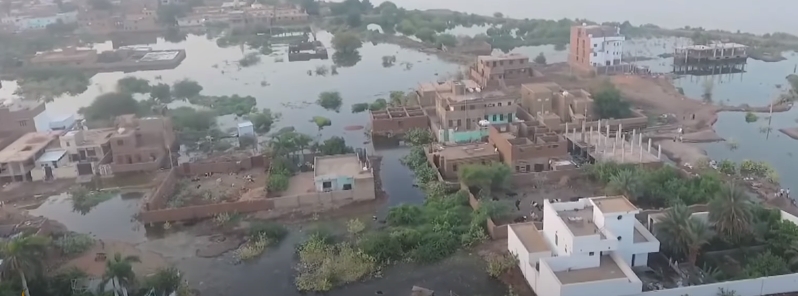Exceptional rainfall and record floods hit African Sahel

Exceptionally heavy rains and record floods across West, Central, and East Africa have affected millions of people in recent weeks, with more than 200 people dead and hundreds of thousands left homeless. Unprecedented rainfall has destroyed homes and crops, adding to the already extremely difficult situation caused by historic locust outbreak and violent conflicts.
Among that worst-hit this year by severe flooding are Burkina Faso, Cameroon, Chad, Ghana, Niger, Mali, Nigeria, Congo Republic, Sudan, and Senegal.
At least 110 people were killed in 11 countries of West and Central Africa, and more than 760 000 affected. Of those, 71 have been killed in Niger.
The worst affected country is Sudan, with at least 102 fatalities and tens of thousands of houses damaged or destroyed, the interior ministry reported.
The Eltomaniat Village in Khartoum has been badly hit as floodwaters completely submerged the area. Around 350 families resided in the village, who have all been left homeless when the flooding struck.
"There has never been so much destruction," said one resident from the state.

AFRICA: Several countries – Senegal, Niger, Nigeria, Chad, Cameroon, Sudan – have recorded heavy rains & floods, causing deaths and displacing hundreds of thousands of people. Floods are also destroying crops, livelihood and increase the spread of water-borne disease. pic.twitter.com/imR75WT65D
— Hajer Naili (@H_NAILI) September 7, 2020
A three-month state of emergency has been declared for the nation as the government allocated more than 150 million Sudanese pounds or about 2.73 million dollars for the flood victims.
Prime Minister Abdalla Hamdok described the situation as "catastrophic and painful." Since the start of the rainy season, about half a million residents have been displaced.
This week, the water levels of the Nile River has hit 17.57 m (57.6 feet), which was its highest since records began over 100 years ago.


Sudan and Niger are experiencing a major flood disaster. You can support thousands of people who are affected by the flood via our website:https://t.co/LZ9hTqoVF4 pic.twitter.com/oLa5pKsiiA
— Humanitarian Relief (@IHHen) September 9, 2020
In Niger, more than 70 fatalities have been reported, while many more have been displaced. Families in several neighborhoods of Niamey were forced to flee after a levee on Niger River's right bank became swollen following heavy downpours.
A state of emergency has also been declared in Senegal amid ongoing major inundations that have killed at least six people.
Parts of the country saw an exceptional amount of rain— up to 200 mm (7.8 inches) of rain fell in a 24-hour period to September 5, which was more than the average rain for the month.
In Burkina Faso, at least 13 people have died and 19 others were injured. Extensive property damage has been reported as floods swept through roads, bridges, houses, and farmland.
The severe weather is stretching the resources of officials and aid workers that have already been struggling with the COVID-19 pandemic, regional conflicts, and other health-related concerns.
"Many of those populations live in flood-prone areas. It’s just a matter of time for them to be at risk of epidemics," said Julie Belanger, OCHA's director for West and Central Africa.
In Nigeria, particularly the Kebbi State, floods damaged more than 500 000 ha (1.2 million acres) of crops.
More heavy rain is expected across the affected region through September, worsening the already dire situation.


Heavy rains have been recorded in the #Sahel regions of West & Central Africa in the past week including #Niger,#Nigeria, #Chad & #Cameroon,leading to devastating floods that have killed dozens & displaced thousands of people.#FaceTheClimateEmergency#ActOnSahel @GretaThunberg pic.twitter.com/o0MkbhTLly
— AaravSeth #EarthWarrior (@AaravSeth888) September 7, 2020
Featured image credit: Al Jazeera English/YouTube (still shot)

How do you cause a world wide famine? Just knock out 1% of food production here and there. Have a case of “rust” (a fungus) destroy the Soybeans in Brazil. Germany follows by shutting down all hog production. Iowa loses 25% due to thunderstorms and 75+ MPH winds.